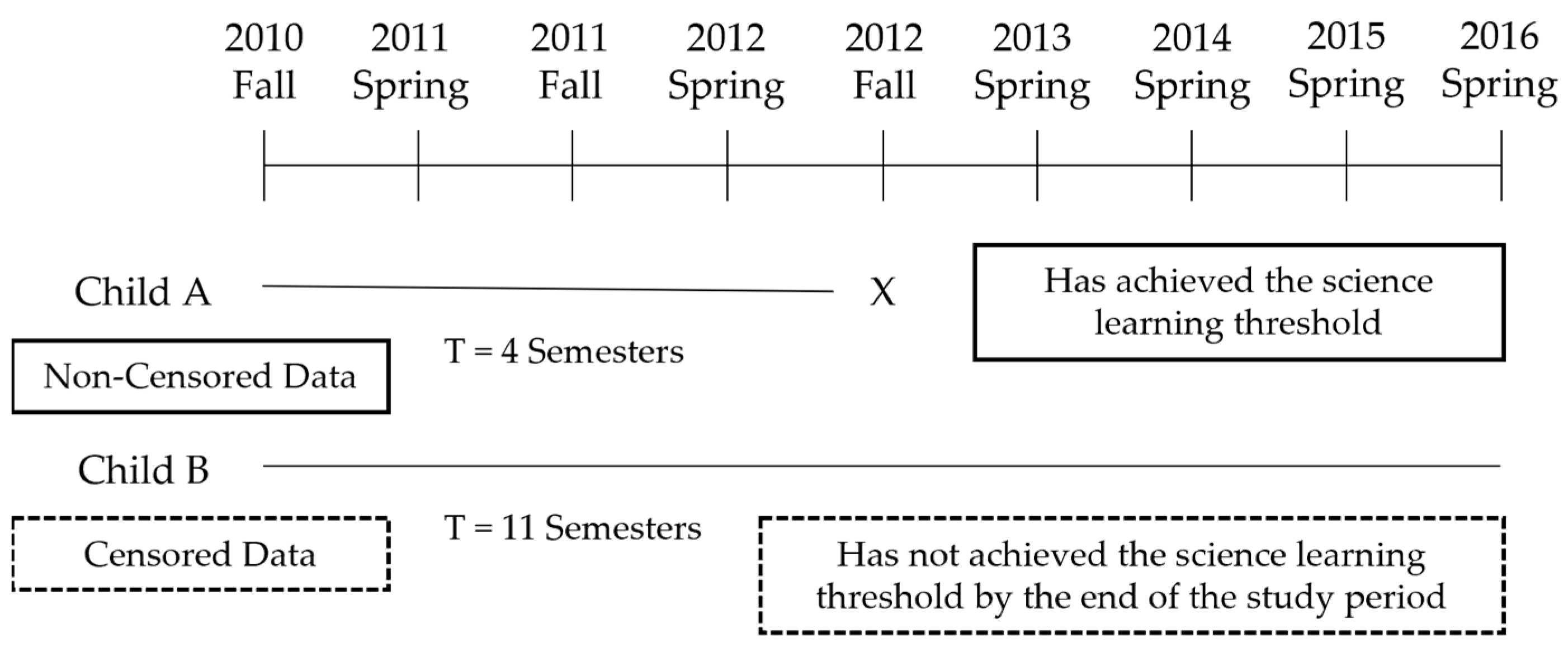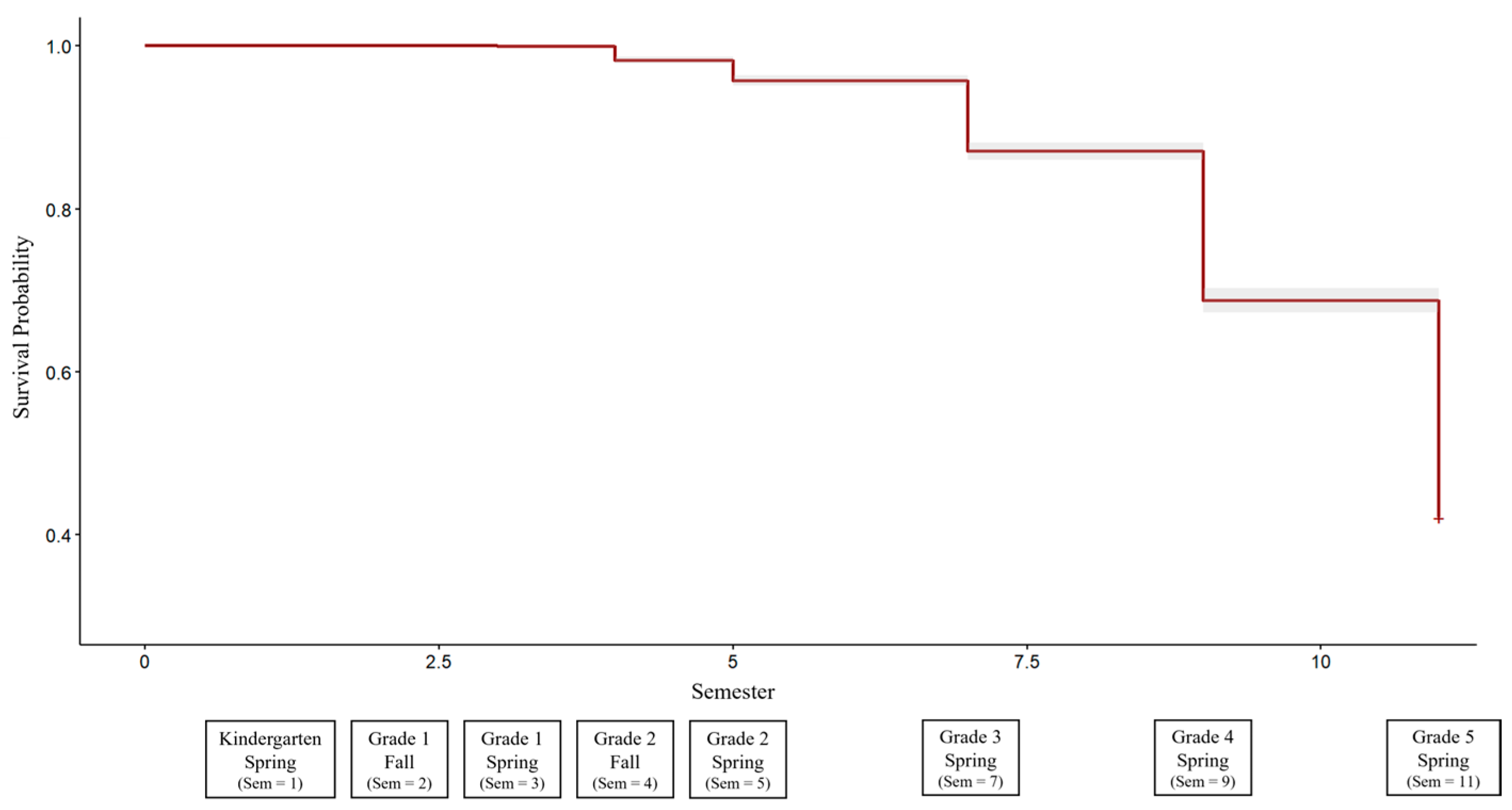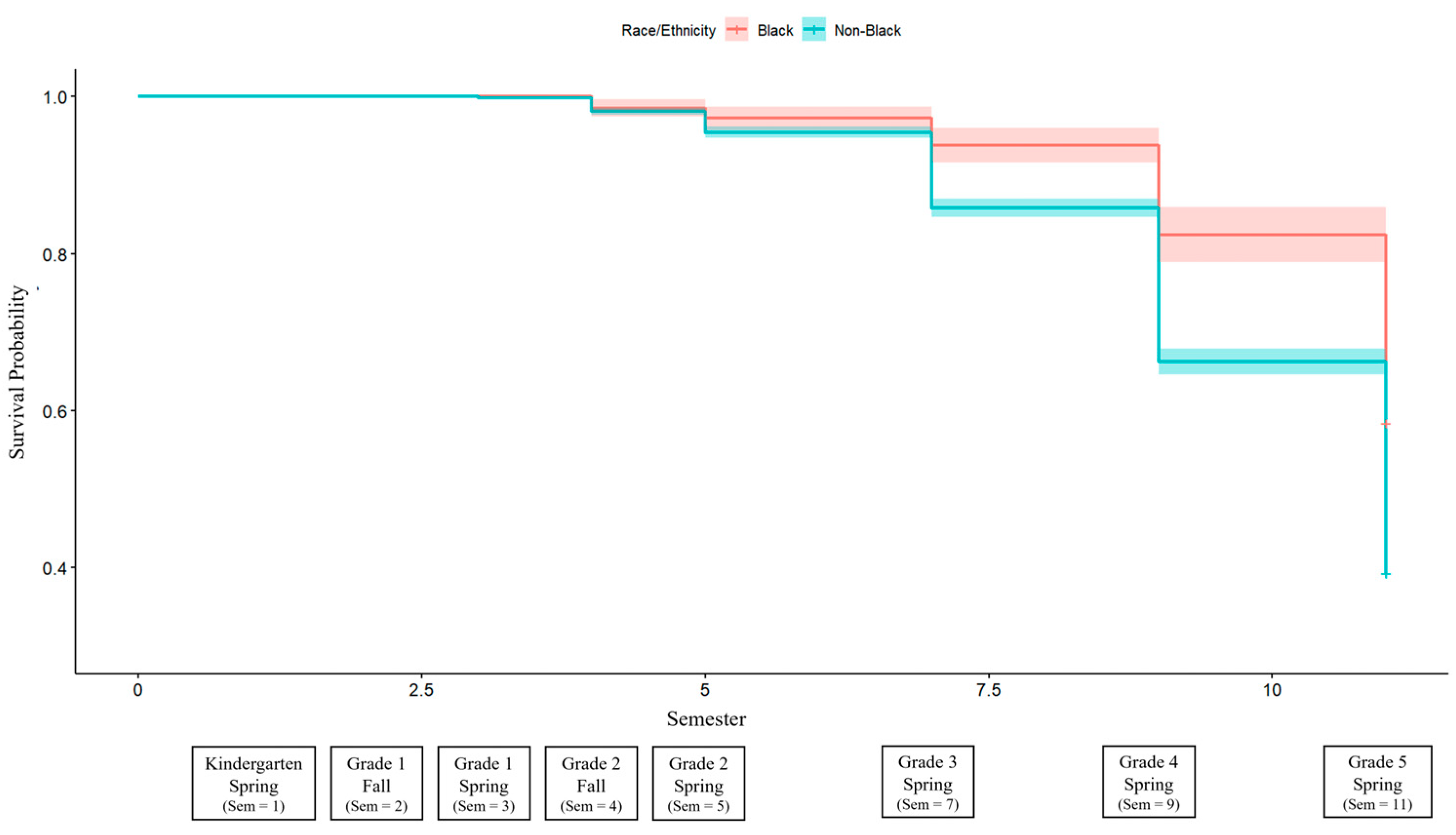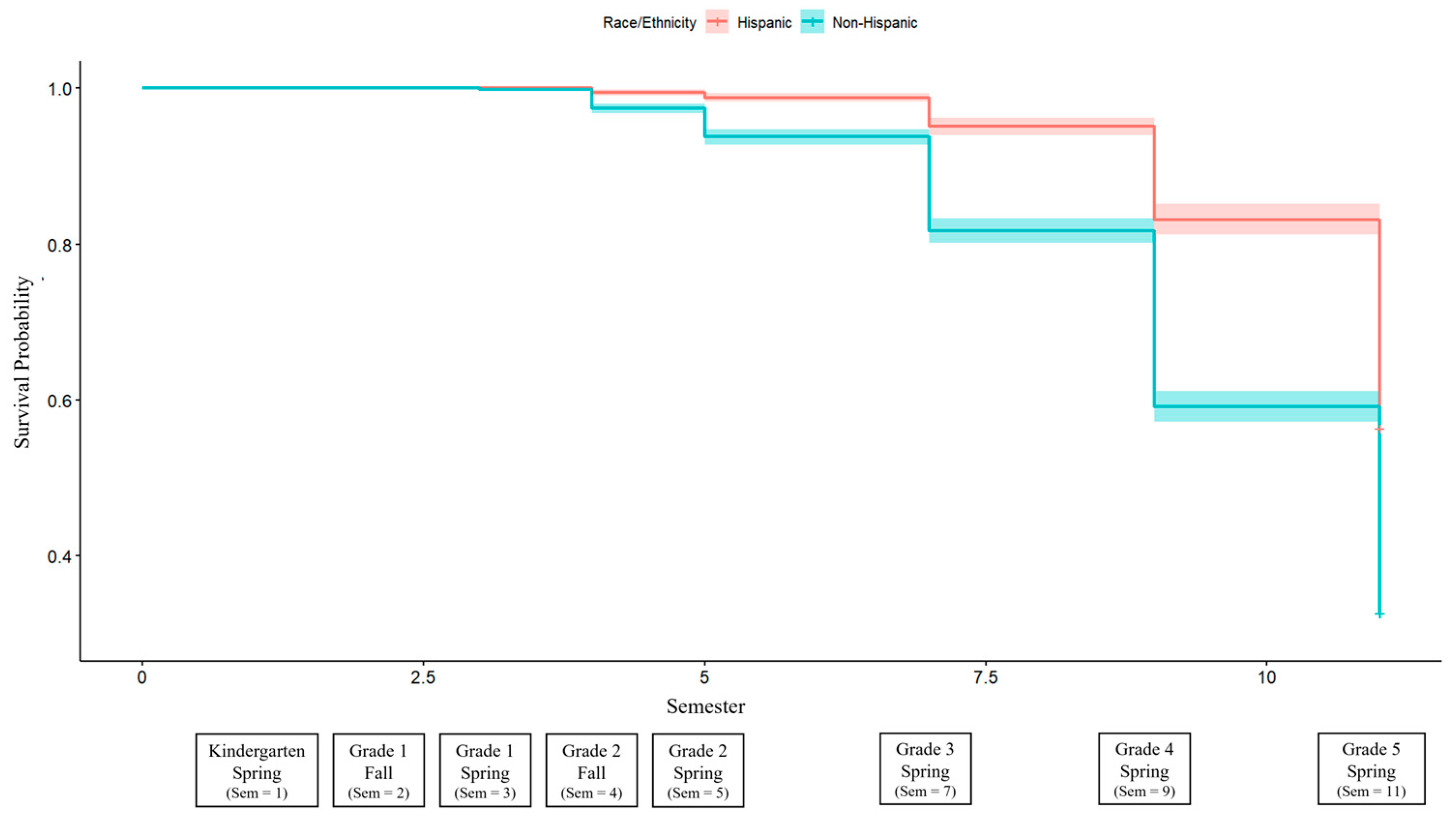The Role of Language and Literacy Skills in Science Learning from Kindergarten to 5th Grade: Mitigating Gender, Racial/Ethnic, and Socio-Economic Disparities
Abstract
1. Introduction
2. Materials and Methods
2.1. Dataset
2.2. Measures
2.2.1. Reading
2.2.2. Science
2.2.3. Externalizing Behavior
2.3. Analytic Strategy
3. Results
3.1. Patterns and Variations in Children’s Surpassing the Threshold
3.2. Factors Mitigating the Disparities in Science Achievement
4. Discussion
5. Conclusions
Author Contributions
Funding
Institutional Review Board Statement
Informed Consent Statement
Data Availability Statement
Conflicts of Interest
References
- National Assessment of Educational Progress. Results from the 2019 Science Assessment. Available online: https://www.nationsreportcard.gov/highlights/science/2019 (accessed on 19 November 2023).
- National Science Teacher Association. NGSS Hub. Available online: https://ngss.nsta.org (accessed on 19 November 2023).
- NGSS Lead States. Next Generation Science Standards: For States, by States; National Academies Press: Washington, DC, USA, 2013. [Google Scholar]
- Wright, T.S.; Domke, L.M. The Role of Language and Literacy in K-5 Science and Social Studies Standards. J. Lit. Res. 2019, 51, 5–29. [Google Scholar] [CrossRef]
- National Academies of Sciences, Engineering, and Medicine. Science and Engineering for Grades 6–12: Investigation and Design at the Center; National Academies Press: Washington, DC, USA, 2019. [Google Scholar]
- MacDonald, A.; Danaia, L.; Sikder, S.; Huser, C. Early Childhood Educators’ Beliefs and Confidence Regarding STEM Education. Int. J. Early Child. 2021, 53, 241–259. [Google Scholar] [CrossRef]
- Siry, C.; Trundle, K.C.; Saçkes, M. Science Education during the Early Childhood Years: Research Themes and Future Directions. In Handbook of Research on Science Education; Lederman, N., Zeidler, D., Lederman, J., Eds.; Routledge: New York, NY, USA, 2023; pp. 499–527. [Google Scholar]
- Tao, Y. Kindergarten Teachers’ Attitudes Toward and Confidence for Integrated STEM Education. J. Res. STEM Educ. Res. 2019, 2, 154–171. [Google Scholar] [CrossRef]
- Chesloff, D. STEM Education Must Start in Early Childhood. Available online: https://www.edweek.org/teaching-learning/opinion-stem-education-must-start-in-early-childhood/2013/03 (accessed on 6 September 2024).
- National Research Council. A Framework for K-12 Science Education: Practices, Crosscutting Concepts, and Core Ideas; National Academies Press: Washington, DC, USA, 2012. [Google Scholar]
- Betancur, L.; Votruba-Drzal, E.; Schunn, C. Socioeconomic Gaps in Science Achievement. Int. J. STEM Educ. 2018, 5, 38. [Google Scholar] [CrossRef] [PubMed]
- Lee, O.; Llosa, L.; Grapin, S.; Haas, A.; Goggins, M. Science and Language Integration with English Learners: A Conceptual Framework Guiding Instructional Materials Development. Sci. Educ. 2019, 103, 317–337. [Google Scholar] [CrossRef]
- Quinn, D.M.; Cooc, N. Science Achievement Gaps by Gender and Race/Ethnicity in Elementary and Middle School: Trends and Predictors. Educ. Res. 2015, 44, 336–346. [Google Scholar] [CrossRef]
- Pew Research Center. STEM Jobs See Uneven Progress in Increasing Gender, Racial and Ethnic Diversity. Available online: https://www.pewresearch.org/science/wp-content/uploads/sites/16/2021/03/PS_2021.04.01_diversity-in-STEM_REPORT.pdf (accessed on 6 September 2024).
- Riegle-Crumb, C.; King, B. Questioning a White Male Advantage in STEM: Examining Disparities in College Major by Gender and Race/Ethnicity. Educ. Res. 2010, 39, 656–664. [Google Scholar] [CrossRef]
- Wang, X. Why Students Choose STEM Majors: Motivation, High School Learning, and Postsecondary Context of Support. Am. Educ. Res. J. 2013, 50, 1081–1121. [Google Scholar] [CrossRef]
- Wai, J.; Putallaz, M.; Makel, M.C. Studying Intellectual Outliers: Are There Sex Differences, and Are the Smart Getting Smarter? Curr. Dir. Psychol. Sci. 2012, 21, 382–390. [Google Scholar] [CrossRef]
- Valla, J.M.; Ceci, S.J. Breadth-Based Models of Women’s Underrepresentation in STEM Fields: An Integrative Commentary on Schmidt (2011) and Nye et al. (2012). Per. Psychol. Sci. 2014, 9, 219–224. [Google Scholar] [CrossRef]
- Wang, M.T.; Degol, J.L. School Climate: A Review of the Construct, Measurement, and Impact on Student Outcomes. Educ. Psychol. Rev. 2016, 28, 315–352. [Google Scholar] [CrossRef]
- Ladson-Billings, G. From the Achievement Gap to the Education Debt: Understanding Achievement in US Schools. Educ. Res. 2006, 35, 3–12. [Google Scholar] [CrossRef]
- Economic Policy Institute. Five Social Disadvantages That Depress Student Performance: Why Schools Alone Can’t Close Achievement Gaps. Available online: https://files.eric.ed.gov/fulltext/ED560463.pdf (accessed on 6 September 2024).
- Beasley, M.A.; Fischer, M.J. Why They Leave: The Impact of Stereotype Threat on the Attrition of Women and Minorities from Science, Math and Engineering Majors. Soc. Psychol. Educ. 2012, 15, 427–448. [Google Scholar] [CrossRef]
- McGee, E. Devalued Black and Latino Identities: A By-Product of STEM College Culture? Am. Educ. Res. J. 2016, 53, 1626–1662. [Google Scholar] [CrossRef]
- Cervetti, G.; Barber, J.; Dorph, R.; Pearson, P.; Goldschmidt, P. The Impact of an Integrated Approach to Science and Literacy in Elementary School Classrooms. J. Res. Sci. Teach. 2012, 49, 631–658. [Google Scholar] [CrossRef]
- Reed, D.K.; Petscher, Y.; Truckenmiller, A.J. The Contribution of General Reading Ability to Science Achievement. Read. Res. Q. 2017, 52, 253–266. [Google Scholar] [CrossRef]
- Yore, L.; Pimm, D.; Tuan, H. The Literacy Component of Mathematical and Scientific Literacy. Int. J. Sci. Math. Educ. 2007, 5, 559–589. [Google Scholar] [CrossRef]
- Norris, S.; Phillips, L. How Literacy in Its Fundamental Sense is Central to Scientific Literacy. Sci. Educ. 2003, 87, 224–240. [Google Scholar] [CrossRef]
- Wellington, J.; Osborne, J. Language and Literacy in Science Education; McGraw-Hill Education: London, UK, 2001. [Google Scholar]
- Maerten-Rivera, J.; Myers, N.; Lee, O.; Penfield, R. Student and School Predictors of High-Stakes Assessment in Science. Sci. Educ. 2010, 94, 937–962. [Google Scholar] [CrossRef]
- Pearson, P.; Moje, E.; Greenleaf, C. Literacy and Science: Each in the Service of the Other. Science 2010, 328, 459–463. [Google Scholar] [CrossRef]
- Yore, L.D. Enhancing Science Literacy for All Students with Embedded Reading Instruction and Writing-To-Learn Activities. J. Deaf. Stud. Deaf. Educ. 2000, 5, 105–122. [Google Scholar] [CrossRef] [PubMed]
- Schleppegrell, M.J. Linguistic Features of the Language of Schooling. Linguist. Educ. 2001, 12, 431–459. [Google Scholar] [CrossRef]
- Lee, O.; Fradd, S. Literacy Skills in Science Learning Among Linguistically Diverse Students. Sci. Educ. 1996, 80, 651–671. [Google Scholar] [CrossRef]
- Wright, T.; Gotwals, A. Supporting Kindergartners’ Science Talk in the Context of an Integrated Science and Disciplinary Literacy Curriculum. Elem. Sch. J. 2017, 117, 513–537. [Google Scholar] [CrossRef]
- National Research Council. A Framework for K-12 Science Education: Practices, Crosscutting Concepts, and Core Ideas; National Academies Press: Washington, DC, USA, 2011. [Google Scholar]
- Gee, J.; Gee, J.P. Social Linguistics and Literacies: Ideology in Discourses; Routledge: London, UK, 2007. [Google Scholar]
- Halliday, M. Language as Social Semiotic: The Social Interpretation of Language and Meaning; Edward Arnold: London, UK, 1978. [Google Scholar]
- Bronfenbrenner, U.; Morris, P.A. The Ecology of Developmental Processes. In Handbook of Child Psychology: Theoretical Models of Human Development; Damon, W., Lerner, R.M., Eds.; John Wiley & Sons Inc.: New York, NY, USA, 1998; pp. 993–1028. [Google Scholar]
- Dickinson, D.K.; Tabors, P.O. Beginning Literacy with Language: Young Children Learning at Home and School; Paul, H. Brookes Publishing Co.: Baltimore, MD, USA, 2001. [Google Scholar]
- Lemke, J.L. Talking Science: Language, Learning, and Values; Ablex Publishing: Norwood, NJ, USA, 1990. [Google Scholar]
- Fradd, S.H. Instructional Assessment: An Integrative Approach to Evaluating Student Performance; Addison-Wesley Publishing Company: Reading, MA, USA, 1994. [Google Scholar]
- American Association for the Advancement of Science. Benchmarks for Science Literacy; Oxford University Press: Oxford, UK, 1994. [Google Scholar]
- Scarborough, A.; Hebbeler, K.M.; Spiker, D.; Simeonsson, R.J. Using Survival Analysis to Describe Developmental Achievements of Early Intervention Recipients at Kindergarten. Infants Young Child. 2011, 24, 133–152. [Google Scholar] [CrossRef]
- Lougheed, J.P.; Benson, L.; Cole, P.; Ram, N. Multilevel Survival Analysis: Studying the Timing of Children’s Recurring Behaviors. Dev. Psychol. 2019, 55, 53–65. [Google Scholar] [CrossRef]
- Clark, T.; Bradburn, M.; Love, S.; Altman, D. Survival Analysis Part I: Basic Concepts and First Analyses. Br. J. Cancer 2003, 89, 232–238. [Google Scholar] [CrossRef]
- Tourangeau, K.; Nord, C.; Le, T.; Wallner-Allen, K.; Hagedorn, M.C.; Leggitt, J.; Najarian, M. Early Childhood Longitudinal Study, Kindergarten Class of 2010–11 (ECLS-K:2011), User’s Manual for the ECLSK:2011 Kindergarten–First Grade Data File and Electronic Codebook, Public Version (NCES 2015-078); National Center for Education Statistics, U.S. Department of Education: Washington, DC, USA, 2015.
- Halle, T.G.; Hair, E.C.; Burchinal, M.; Anderson, R.; Zaslow, M. In the Running for Successful Outcomes: Exploring the Evidence for Thresholds of School Readiness Technical Report. Available online: https://aspe.hhs.gov/reports/running-successful-outcomes-exploring-evidence-thresholds-school-readiness-technical-report-0 (accessed on 6 September 2024).
- Gresham, F.M.; Elliott, S.N. Social Skills Rating System; NCS Pearson: Minneapolis, MN, USA, 1990. [Google Scholar]
- Kaplan, E.L.; Meier, P. Nonparametric Estimation from Incomplete Observations. J. Am. Stat. Assoc. 1958, 53, 457–481. [Google Scholar] [CrossRef]
- Guo, S. Survival Analysis; Oxford University Press: Oxford, UK, 2010. [Google Scholar]
- Cox, D. Regression Models and Life-Tables. J. R. Stat. Soc. Ser. B 1972, 34, 187–202. [Google Scholar] [CrossRef]
- Therneau, T. Mixed Effects Cox Models [R Package Coxme Version 2.2-18.1]. Available online: https://cran.hafro.is/web/packages/coxme/coxme.pdf (accessed on 6 September 2024).
- Singer, J.D.; Willett, J.B. Modeling the Days of Our Lives: Using Survival Analysis When Designing and Analyzing Longitudinal Studies of Duration and the Timing of Events. Psychol. Bull. 1991, 110, 268–290. [Google Scholar] [CrossRef]
- Willett, J.; Singer, J. From Whether to When: New Methods for Studying Student Dropout and Teacher Attrition. Rev. Educ. Res. 1991, 61, 407–450. [Google Scholar] [CrossRef]
- The National Science Teachers Association. Early Childhood Science Education. Available online: https://www.nsta.org/nstas-official-positions/early-childhood-science-education#:~:text=The%20National%20Science%20Teachers%20Association,and%20throughout%20their%20entire%20lives (accessed on 6 September 2024).
- Scammacca, N.; Fall, A.-M.; Capin, P.; Roberts, G.; Swanson, E. Examining Factors Affecting Reading and Math Growth and Achievement Gaps in Grades 1–5: A Cohort-Sequential Longitudinal Approach. J. Educ. Psychol. 2020, 112, 718–734. [Google Scholar] [CrossRef] [PubMed]
- Miller, K.; Sonnert, G.; Sadler, P. The Influence of Students’ Participation in STEM Competitions on Their Interest in STEM Careers. Int. J. Sci. Educ. 2018, 8, 95–114. [Google Scholar] [CrossRef]
- Wang, M.; Degol, J. Motivational Pathways to STEM Career Choices: Using Expectancy–Value Perspective to Understand Individual and Gender Differences in STEM Fields. Dev. Rev. 2013, 33, 304–340. [Google Scholar] [CrossRef] [PubMed]
- Duncan, G.J.; Murnane, R.J. Whither Opportunity? Rising Inequality, Schools, and Children’s Life Chances; Russell Sage Foundation: New York, NY, USA, 2011. [Google Scholar]
- Ingersoll, R.; Perda, D. Is the Supply of Mathematics and Science Teachers Sufficient? Am. Educ. Res. J. 2010, 47, 563–594. [Google Scholar] [CrossRef]
- Curran, F.C.; Kellogg, A.T. Understanding Science Achievement Gaps by Race/Ethnicity and Gender in Kindergarten and First Grade. Educ. Res. 2016, 45, 273–282. [Google Scholar] [CrossRef]
- Hanushek, E.A.; Light, J.D.; Peterson, P.E.; Talpey, L.M.; Woessmann, L. Long-Run Trends in the US SES—Achievement Gap. Educ. Financ. Policy 2022, 17, 608–640. [Google Scholar] [CrossRef]
- Morgan, P.L.; Farkas, G.; Hillemeier, M.M.; Maczuga, S. Science Achievement Gaps Begin Very Early, Persist, and Are Largely Explained by Modifiable Factors. Educ. Res. 2016, 45, 18–35. [Google Scholar] [CrossRef]
- Henry, D.A.; Betancur Cortés, L.; Votruba-Drzal, E. Black–White Achievement Gaps Differ by Family Socioeconomic Status from Early Childhood Through Early Adolescence. J. Educ. Psychol. 2020, 112, 1471–1489. [Google Scholar] [CrossRef]
- Ruddell, R.; Ruddell, M. Language Acquisition and Literacy Processes. In Theoretical Models and Processes of Reading; Ruddell, R., Ruddell, M., Singer, H., Eds.; International Reading Association: Newark, DE, USA, 1994; pp. 22–42. [Google Scholar]
- Tuttle, N.; Kaderavek, J.; Molitor, S.; Czerniak, C.; Johnson-Whitt, E.; Bloomquist, D.; Namatovu, W.; Wilson, G. Investigating the Impact of NGSS-Aligned Professional Development on PreK-3 Teachers’ Science Content Knowledge and Pedagogy. J. Sci. Teach. Educ. 2016, 27, 717–745. [Google Scholar] [CrossRef]
- Greenfield, D.; Jirout, J.; Dominguez, X.; Greenberg, A.; Maier, M.; Fuccillo, J. Science in the Preschool Classroom: A Programmatic Research Agenda to Improve Science Readiness. Early Educ. Dev. 2009, 20, 238–264. [Google Scholar] [CrossRef]
- Trygstad, P.; Smith, P.; Banilower, E.; Nelson, M. The Status of Elementary Science Education: Are We Ready for the Next Generation Science Standards? Horizon Research: Chapel Hill, NC, USA, 2013. [Google Scholar]
- Fang, Z. Language Correlates of Disciplinary Literacy. Top. Lang. Disord. 2012, 32, 19–34. [Google Scholar] [CrossRef]
- Child Trends. Disparities in Early Learning and Development: Lessons from the Early Childhood Longitudinal Study—Birth Cohort (ECLS-B). 2009. Available online: https://www.childtrends.org/publications/disparities-in-early-learning-and-development-lessons-from-the-early-childhood-longitudinal-study-birth-cohort-ecls-b (accessed on 6 September 2024).
- Hart, B.; Risley, T.R. Meaningful Differences in the Everyday Experience of Young American Children; Paul H Brookes: Baltimore, MD, USA, 1995. [Google Scholar]




| Semester | Survival Probability | SE | Lower 95% CI | Upper 95% CI |
|---|---|---|---|---|
| K Spring | 1 | - | - | - |
| G1 Fall | 1 | - | - | - |
| G1 Spring | 0.99 | 0.00 | 0.99 | 1.00 |
| G2 Fall | 0.98 | 0.00 | 0.97 | 0.98 |
| G2 Spring | 0.95 | 0.00 | 0.95 | 0.96 |
| G3 Spring | 0.87 | 0.00 | 0.86 | 0.88 |
| G4 Spring | 0.68 | 0.00 | 0.67 | 0.70 |
| G5 Spring | 0.42 | 0.00 | 0.40 | 0.43 |
| Race/Ethnicity | Semester | Survival Probability | SE | Lower 95% CI | Upper 95% CI |
|---|---|---|---|---|---|
| Black | K Spring | 1 | - | - | - |
| G1 Fall | 1 | - | - | - | |
| G1 Spring | 1 | - | - | - | |
| G2 Fall | 0.98 | 0.00 | 0.97 | 0.99 | |
| G2 Spring | 0.97 | 0.00 | 0.95 | 0.98 | |
| G3 Spring | 0.93 | 0.01 | 0.91 | 0.96 | |
| G4 Spring | 0.82 | 0.01 | 0.78 | 0.85 | |
| G5 Spring | 0.58 | 0.02 | 0.54 | 0.63 | |
| Non-Black | K Spring | 1 | - | - | - |
| G1 Fall | 1 | - | - | - | |
| G1 Spring | 0.99 | 0.00 | 0.99 | 1.00 | |
| G2 Fall | 0.98 | 0.00 | 0.97 | 0.98 | |
| G2 Spring | 0.95 | 0.00 | 0.94 | 0.96 | |
| G3 Spring | 0.85 | 0.00 | 0.84 | 0.87 | |
| G4 Spring | 0.66 | 0.00 | 0.64 | 0.67 | |
| G5 Spring | 0.39 | 0.00 | 0.37 | 0.41 |
| Race/Ethnicity | Semester | Survival Probability | SE | Lower 95% CI | Upper 95% CI |
|---|---|---|---|---|---|
| Hispanic | K Spring | 1 | - | - | - |
| G1 Fall | 1 | - | - | - | |
| G1 Spring | 1 | - | - | - | |
| G2 Fall | 0.99 | 0.00 | 0.99 | 0.99 | |
| G2 Spring | 0.98 | 0.00 | 0.98 | 0.99 | |
| G3 Spring | 0.95 | 0.00 | 0.94 | 0.96 | |
| G4 Spring | 0.83 | 0.00 | 0.81 | 0.85 | |
| G5 Spring | 0.56 | 0.01 | 0.53 | 0.59 | |
| Non-Hispanic | K Spring | 1 | - | - | - |
| G1 Fall | 1 | - | - | - | |
| G1 Spring | 0.99 | 0.00 | 0.99 | 1.00 | |
| G2 Fall | 0.97 | 0.00 | 0.96 | 0.98 | |
| G2 Spring | 0.93 | 0.00 | 0.92 | 0.94 | |
| G3 Spring | 0.81 | 0.00 | 0.80 | 0.83 | |
| G4 Spring | 0.59 | 0.01 | 0.57 | 0.61 | |
| G5 Spring | 0.32 | 0.00 | 0.30 | 0.34 |
| Model 1 | Model 2 | |||||
|---|---|---|---|---|---|---|
| Estimate | Standard Error | Hazard Ratio (HR) | Estimate | Standard Error | Hazard Ratio (HR) | |
| Main Effects | ||||||
| Age | 0.013 * | 0.005 | 1.013 | 0.013 * | 0.005 | 1.013 |
| Male | 0.155 *** | 0.046 | 1.167 | 2.114 *** | 0.564 | 8.282 |
| Black | −0.288 ** | 0.096 | 0.749 | −2.588 * | 1.185 | 0.075 |
| Hispanic | −0.162 * | 0.066 | 0.850 | −1.931 * | 0.788 | 0.144 |
| SES | 0.164 *** | 0.042 | 1.178 | 1.421 ** | 0.494 | 4.141 |
| Externalizing Behavior | 0.027 | 0.044 | 1.027 | 0.022 | 0.044 | 1.022 |
| Literacy Skills | 0.076 *** | 0.002 | 1.080 | 0.105 *** | 0.010 | 1.111 |
| Moderations | ||||||
| Male × Literacy Skills | −0.013 *** | 0.003 | 0.986 | |||
| Black × Literacy Skills | 0.016 * | 0.008 | 1.016 | |||
| Hispanic × Literacy Skills | 0.012 * | 0.005 | 1.012 | |||
| SES × Literacy Skills | −0.009 ** | 0.003 | 0.990 | |||
Disclaimer/Publisher’s Note: The statements, opinions and data contained in all publications are solely those of the individual author(s) and contributor(s) and not of MDPI and/or the editor(s). MDPI and/or the editor(s) disclaim responsibility for any injury to people or property resulting from any ideas, methods, instructions or products referred to in the content. |
© 2024 by the authors. Licensee MDPI, Basel, Switzerland. This article is an open access article distributed under the terms and conditions of the Creative Commons Attribution (CC BY) license (https://creativecommons.org/licenses/by/4.0/).
Share and Cite
Jang, W.; Kwon, K.-A.; Horm, D. The Role of Language and Literacy Skills in Science Learning from Kindergarten to 5th Grade: Mitigating Gender, Racial/Ethnic, and Socio-Economic Disparities. Educ. Sci. 2024, 14, 994. https://doi.org/10.3390/educsci14090994
Jang W, Kwon K-A, Horm D. The Role of Language and Literacy Skills in Science Learning from Kindergarten to 5th Grade: Mitigating Gender, Racial/Ethnic, and Socio-Economic Disparities. Education Sciences. 2024; 14(9):994. https://doi.org/10.3390/educsci14090994
Chicago/Turabian StyleJang, Wonkyung, Kyong-Ah Kwon, and Diane Horm. 2024. "The Role of Language and Literacy Skills in Science Learning from Kindergarten to 5th Grade: Mitigating Gender, Racial/Ethnic, and Socio-Economic Disparities" Education Sciences 14, no. 9: 994. https://doi.org/10.3390/educsci14090994
APA StyleJang, W., Kwon, K.-A., & Horm, D. (2024). The Role of Language and Literacy Skills in Science Learning from Kindergarten to 5th Grade: Mitigating Gender, Racial/Ethnic, and Socio-Economic Disparities. Education Sciences, 14(9), 994. https://doi.org/10.3390/educsci14090994







